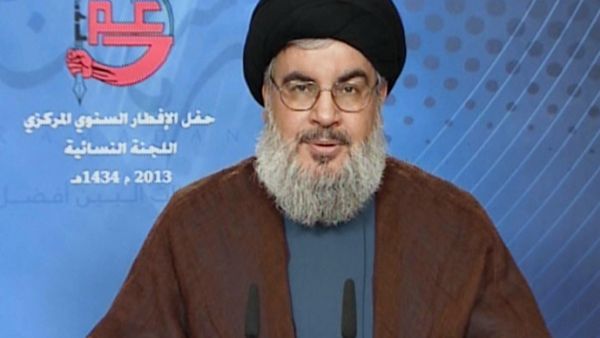By Dana Khraiche and Thomas El-Basha
Hezbollah leader Sayyed Hasan Nasrallah wrote off Wednesday the recent European Union decision to blacklist the military wing of his group and said a Lebanese government could not be formed without his party.
“We were not surprised with the [EU] decision. Rather we expected it and in fact found it odd it had taken so long,” Nasrallah said in a televised address during an iftar event.
“The facts prove that the Israelis and the Americans exercised tremendous pressure on the European Union countries to take such a decision,” he said, adding that blacklisting Hezbollah served the interests of the Jewish state.
“Content of discussions, deliberations and contacts over the course of months and years prove that Europe succumbed to the will of the Israelis and the Americans even though this was not out of its own conviction,” Nasrallah said.
The EU’s 28 member states unanimously agreed Monday to designate Hezbollah’s military wing as a terrorist organization.
Israel and the U.S. had long pressured the EU to blacklist Hezbollah, especially after Bulgaria accused the Lebanese party of orchestrating the 2012 bombing in the city of Burgas.
The blast, which killed five Israeli tourists and their Bulgarian driver, also came at a time when a Cypriot court indicted a Lebanese-Swedish man affiliated with Hezbollah in plotting attacks against Israelis.
Hezbollah has denied involvement in the Burgas bombing.
Although Nasrallah noted that the EU had yet to issue an official statement of the decision, he said that by blacklisting Hezbollah EU member states were providing “legal cover” for Israeli aggressions against Lebanon.“This is also something dangerous because these states ... are providing legal cover for any aggression on Lebanon. Israel will say ‘I am fighting a terrorist organization,’” Nasrallah said.
“They [EU] are making themselves fully complicit in any Israeli aggression against Lebanon, the resistance or any resistance target,” Nasrallah added.
He said the EU decision had no tangible impact on the resistance group, describing it as a form of psychological intimidation.
“You will never diminish our morale given that the only aspect of this decision is psychological,” he said.
Nasrallah also ruled out any possibility that Hezbollah would be affected financially or militarily. “We don’t have money in European banks,” Nasrallah said.
EU Ambassador to Lebanon Angelina Eichhorst said Tuesday that the EU decision would not affect ties with the Lebanese government even if Hezbollah is represented, because the EU differentiated between Hezbollah’s political and military branches.
Eichhorst will on Thursday meet former MP Ammar Musawi, the party official in charge of international relations in the southern suburbs of Beirut. She will also meet Mohammad Fneish, Hezbollah’s caretaker Minister for Administrative Development.
Addressing the EU, Nasrallah said: “We know that any decision has a goal and the goal here is clear: it’s to subjugate us and force us to retreat, regress, be hesitant and instill fear in us.”
“I tell you that that you will only reap failure and disappointment,” he added.
Nasrallah said the EU decision was not based on principle, questioning why the EU had not blacklisted Israeli’s “military wing,” referring to its army, as a terrorist organization.
“You admit that Israel occupies Arab territories ... and does not implement international resolutions for decades and the entire world has watched Israeli massacres on TV.”
“But those who fought, endured pain, died and were imprisoned but were able to regain [their] land, dignity and still carry arms to fend off any aggressor, you, [the EU] come to them and call them terrorists,” Nasrallah said.
Speaking on domestic politics, Nasrallah said the decision would have no impact, particularly for the Cabinet formation.
“If some groups ... are planning to isolate or corner us [after the decision] ... by saying the decision affirms that a government excluding Hezbollah should be formed ... I tell them: The situation after the European Union decision is the same as it was before the European decision,” he said. “A government in which Hezbollah is not represented will not be formed, this is logic.”
Nasrallah reiterated his call for resuming National Dialogue sessions and for the formation of a “capable political government which protects Lebanon.”
Prime Minister-designate Tammam Salam has been unable to form a government since April, as he has been overwhelmed with conditions and counter-conditions set by rival political parties.
While Hezbollah and its allies insist on a national unity government embracing all political parties, rival March 14 groups call for forming a nonpolitical Cabinet.
Future Movement MP Atef Majdalani said that after the EU decision, it would be impossible to form a political government.
Speaking to a local radio station, Majdalani called for forming a government whose ministers were not politicians “that is capable of ... curbing the economic deterioration of the country and restoring the stature of the state and its institutions.”
Separately, Speaker Nabih Berri said during his weekly meeting with MPs that his announcement earlier that the March 8 alliance had been disbanded and its earlier demand for veto power dropped was aimed at helping Salam put his Cabinet together, and was not a mere maneuver as described by the March 14 coalition.
For its part, the March 14 general secretariat called on Hezbollah to make a “historical compromise” by handing its weapons to the Lebanese state as well as ending its military involvement in neighboring Syria.









